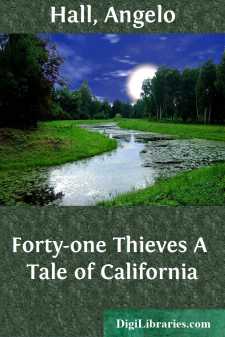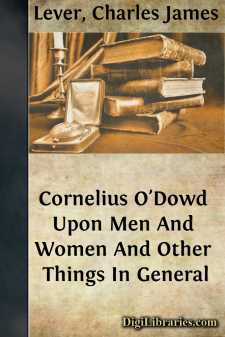Literary Collections
- American 84
- Ancient, Classical & Medieval 14
- Asian 1
- Australian & Oceanian 1
- Canadian 55
- Continental European 121
- English, Irish, Scottish, Welsh 179
- Essays 160
- General 24
- Letters 46
- Middle Eastern 1
Literary Collections Books
Sort by:
by:
Angelo Hall
Dead Men Tell No Tales In the cemetery on the hill near the quiet village of Reedsville, Pennsylvania, you may find this inscription:WILLIAM F. CUMMINSson of Col. William & Martha Cumminswho was killed by highwaymen nearNevada City, CaliforniaSeptember 1, 1879aged 45 yrs. and 8 monthsBe ye therefore also readyFor the Son of Man comethAt an hour when ye think not. It is a beautiful spot, on the road...
more...
by:
Edmund Gosse
CAMDEN'S "BRITANNIA" BRITAIN: or a chorographical description of the most flourishingKingdomes, England, Scotland and Ireland, and the Ilands adioyning;out of the depth of Antiquitie: beautified with Mappes of the severallShires of England; Written first in Latine by William Camden,Clarenceux K. of A. Translated newly into English by Philémon Holland.Londini, Impensis Georgii Bishop &...
more...
by:
Honore de Balzac
CHAPTER I. PROLOGUE In the year 1800, toward the close of October, a foreigner, accompanied by a woman and a little girl, was standing for a long time in front of the palace of the Tuileries, near the ruins of a house recently pulled down, at the point where in our day the wing begins which was intended to unite the chateau of Catherine de Medici with the Louvre of the Valois. The man stood there with...
more...
by:
George Gissing
THE FOLD AND THE SHEPHERD 'So to-morrow, Alice,' said Dr. Madden, as he walked with his eldest daughter on the coast-downs by Clevedon, 'I shall take steps for insuring my life for a thousand pounds.' It was the outcome of a long and intimate conversation. Alice Madden, aged nineteen, a plain, shy, gentle-mannered girl, short of stature, and in movement something less than graceful,...
more...
by:
Henry Kingsley
INTRODUCTORY. Near the end of February 1857, I think about the 20th or so, though it don't much matter; I only know it was near the latter end of summer, burning hot, with the bushfires raging like volcanoes on the ranges, and the river reduced to a slender stream of water, almost lost upon the broad white flats of quartz shingle. It was the end of February, I said, when Major Buckley, Captain...
more...
CHAPTER I. "THERE is a book of record in your mind, Edwin," said an old man to his young friend, "a book of record, in which every act of your life is noted down. Each morning a blank page is turned, on which the day's history is written in lines that cannot be effaced. This book of record is your memory; and, according to what it bears, will your future life be happy or miserable. An...
more...
by:
Charles Cotton
They who write the life of Augustus Caesar,—[Suetonius, Life of Augustus, c. 25.]—observe this in his military discipline, that he was wonderfully liberal of gifts to men of merit, but that as to the true recompenses of honour he was as sparing; yet he himself had been gratified by his uncle with all the military recompenses before he had ever been in the field. It was a pretty invention, and...
more...
by:
Alexander Whyte
I. JOSHUA REDIVIVUS ‘He sent me as a spy to see the land and to try the ford.’ Rutherford. Samuel Rutherford, the author of the seraphic Letters, was born in the south of Scotland in the year of our Lord 1600. Thomas Goodwin was born in England in the same year, Robert Leighton in 1611, Richard Baxter in 1615, John Owen in 1616, John Bunyan in 1628, and John Howe in 1630. A little...
more...
INTRODUCTION The circumstances which have made me responsible for selecting and editing the correspondence of Robert Louis Stevenson are the following. He was for many years my closest friend. We first met in 1873, when he was in his twenty-third year and I in my twenty-ninth, at the place and in the manner mentioned at page 54 of this volume. It was my good fortune then to be of use to him, partly by...
more...
MYSELF. Bland Reader,—If you ever look into the Irish papers—and I hope you are not so exclusive regarding them as is Mr Cobden with the 'Times'—you will see that, under the title, "Landed Estates Court, County Mayo," Judge Dobbs has just sold the town and lands of Kilmuray-nabachlish, Ballaghy, and Gregnaslattery, the property of Cornelius O'Dowd, Esq. of Dowd's...
more...











